
Four months ago, on July 23, Rep. Jerry Nadler (D-N.Y.) and Sen. Kamala Harris (D-Calif.) introduced the Marijuana Opportunity, Reinvestment and Expungement Act, or MORE Act, in Congress. The MORE Act is on track to be the first comprehensive marijuana reform legislation set to be voted on in Congress after the House Judiciary Committee voted 24-10 in favor of the bill on Wednesday, Nov. 20. The MORE Act now moves to the next stage of the process, which would be a vote in the Democratic-dominated House. (Note that Democrats have a considerably more positive view on legalizing cannabis than Republicans do.)
Some in the federal government want to see these conflicts in the marijuana laws, and the vast array of problems and losses they cause, resolved. ”For far too long, we have treated marijuana as a criminal justice problem instead of a matter of personal choice and public health. Whatever one’s views on the use of marijuana for recreational or medicinal purposes, arresting, prosecuting and incarcerating users at the federal level is unwise and unjust,” House Judiciary Committee chairman Jerry Nadler said in his opening statement on the MORE Act on Nov. 20.
If the bill were approved in its current form, here’s a brief summary of its key points:
- Decriminalizes cannabis at the federal level by removing it from the Controlled Substances Act.
- Requires federal courts to expunge prior convictions for cannabis offenses, or at least allows prior offenders to request expungement or a review of their case.
- Establishes a 5% federal tax on cannabis and cannabis products that’d be used to create an Opportunity Trust Fund. This Fund would assist individuals disproportionately impacted by the War on Drugs, provide loans to small businesses in the cannabis industry, and help those adversely impacted by the War on Drugs minimize barriers to marijuana licensing and employment.
Essentially, the MORE Act ensures that states would have the right to regulate their own industries, but it would allow the federal government to collect their piece of the pie with a 5% tax on legal products. It would also help to right the perceived wrongs of the War on Drugs by helping those most impacted by the federal government’s efforts to stamp out drug use, including cannabis.
The MORE Act already has more than 50 co-sponsors, and it looks to have a very good chance of passage in the House.
A Concern
One major hurdle in recreationally legalized states right now is black market cannabis. Illicit producers don’t have to wait for cultivation, processing, distribution, or sales licenses to be approved, they don’t pay state or federal income tax, and they avoid state, local, excise, and wholesale taxation (depending on the state). If the federal government adds yet another layer of taxation atop legal cannabis, it’s only going to make the price disparity between legal and illicit marijuana even wider.
This could potentially put cannabis sales tax at a total rate of 28%. That is totally ridiculous for a plant that many will soon find out is not harmful by standard means.

Introduced on Jul 23, 2019
This bill is in the first stage of the legislative process. It was introduced into Congress on July 23, 2019. It will typically be considered by committee next before it is possibly sent on to the House or Senate as a whole.
Prognosis: 1% chance of being enacted according to Skopos Labs (details)
Source: Congress.gov


